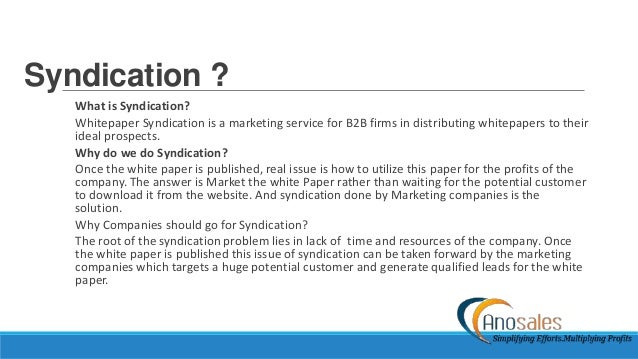

Both of these provisions are subject to a “small business” threshold, where the cash method is available to a qualifying business, and where the business interest expense limitation does not apply to a qualifying business. The new tax law expands the availability of the cash method of accounting, as well as a new restriction on business interest expense deductions. Following is the original version of our article. Update: Shortly after publication of this article, new legislation was enacted that corrects the definition of a “limited entrepreneur” with respect to a tax shelter, now referring to the same definition used for a farming syndicate (we observed in our original article that this likely was the correct definition). Technology & Life Sciences | National Practice.
Syndicate definition professional#
Professional Services | National Practice.Manufacturing & Distribution | National Practice.Commercial Real Estate | National Practice.Banking & Financial Services | National Practice.Defined Contribution Administration Services.Defined Benefit Administration Services.Insurance Appraisals & Tangible Asset Valuation.Cybersecurity & Privacy Resource Library.Litigation Support, Economic Damages & Expert Testimony.COVID-19 Loan & Capital Assistance Services.Accounting, Bookkeeping and Business Process Outsourcing.Private Client Tax & Accounting Services.Frequently Asked Questions About Cost Segregation.Section 382: Use of Net Operating Losses.Additional ResourcesĬFI offers the Financial Modeling & Valuation Analyst (FMVA)™ certification program for those looking to take their careers to the next level. Understanding the pros and cons are important for anyone in the financial and business worlds considering the prospect of joining a syndicate. The potential for great opportunities and increased profit while minimizing risk are all great aspects of syndication. While the opportunity to acquire more real estate is a major advantage, one that smaller companies, alone, might not be able to enjoy, the drawback is that the potential to end up with a less advantageous location is very real.

However, a major issue comes with the fact that syndicated businesses typically must vote on different opportunities and purchases and make a group decision on what locations will be purchased and what companies get each location. If, for example, a number of companies syndicate in order to seize the opportunity to acquire more real estate, it means that they can potentially expand their independent organizations and grow not only their client base but their potential profit. This is especially true when it comes to multiple companies or corporations banding together to work on a specific project or task.

Perhaps the largest drawback of syndication is the aspect of group mentality and decision-making. It also means that the group enjoys the luxury of taking on more risky trades with less fear of potential risk repercussions. For example, if a group of independent traders and brokers form a syndicate during a particularly active month in the markets, more stocks can be bought and sold, with the group collectively assuming the risks while getting more money to utilize to maximize the potential reward. The positive aspects of forming syndicates, specifically in the financial world, include the ability to spread out risk while maximizing reward. In the realm of trading, a syndicate is usually a group of independent traders and brokers that band together to collectively assume the risk of buying and selling securities. For tax reasons, syndicates are treated as newly-formed corporations or partnerships in order to keep taxation at a minimum. In many instances, a syndicate is formed on a temporary basis, though temporary is defined as whatever length of time the groups within the syndicate need to promote one another and accomplish the goal that they’ve established. In investment banking, syndicated lending is when a group of banks provides the capital for a single loan, spreading the risk across several institutions.

In most cases – almost entirely true in the case of syndicated companies and corporations – the primary purpose is to promote goods and services and increase profits for all the entities involved. A syndicate’s primary notable quality is that the groups within it work together to conduct some type of business in order to pursue and promote their collective interests. The group is organized independently by the entities that form it. A syndicate is an organized group of just about anything – corporations, other entities, or even individuals.


 0 kommentar(er)
0 kommentar(er)
